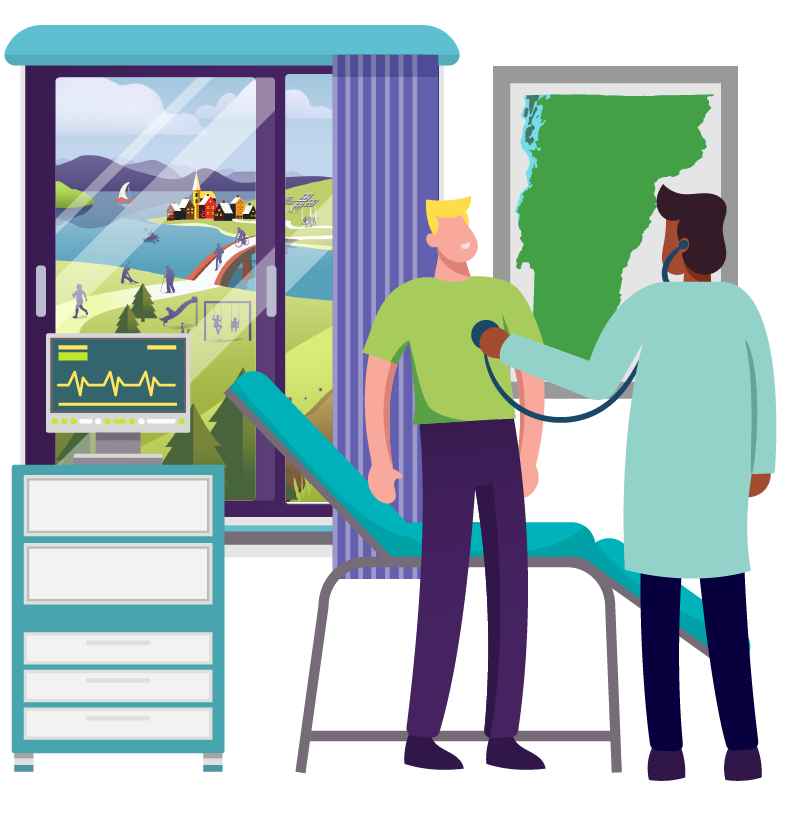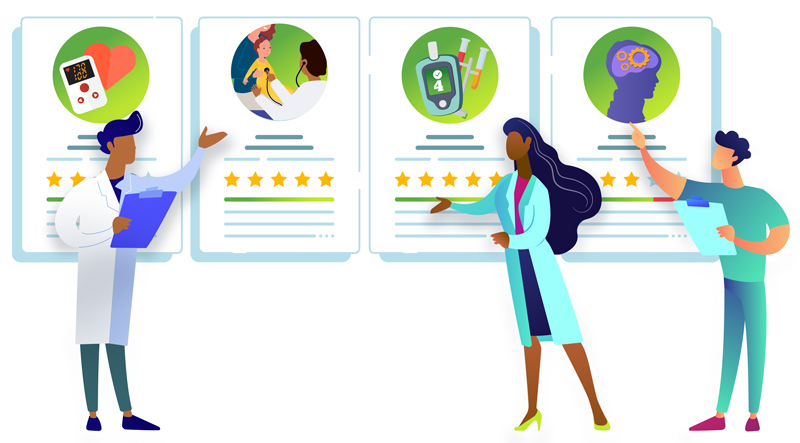Prevention Strategy
At OneCare, we take a population health management approach to transforming our system from fee-for-service to value-based care. To be successful in reducing cost and improving health outcomes, we must shift the culture of our health care system to one that focuses on health equity and prevention of disease in order to improve health outcomes and stabilize health care spending. Therefore, prevention, with an explicit focus on health equity, is a through line in everything we do to achieve value-based care.
Prevention is a through line across OneCare’s population health management approach to improving health outcomes and reducing health care spending:
- Payment Programs: Our payment reform model is designed to incentivize preventive health care and early detection of disease.
- Data & Analytics: OneCare Vermont uses data to measure health care cost, quality, and utilization, helping providers identify patients who could most benefit from preventive care.
- Care Coordination: Our role in expanding care coordination helps all healthcare and community providers work together on a patient centered, holistic care plan to monitor patient status, remain aligned in the approach to care, and optimally manage chronic disease.
- Quality Improvement & Measurement: Our quality program promotes processes for timely follow-up, screenings, and disease management initiatives to prevent complications and optimize health outcomes for Vermonters.
- Collaborations: OneCare provides the bridge for collaboration between providers, community partners, and our on-staff experts to amplify existing community and clinical-based prevention efforts in our participating provider network across Vermont’s health service areas.
Prevention in Payment Programs

How OneCare incentivizes prevention in our payment programs:
OneCare’s payment model pays providers based on the quality of care they deliver, which requires a strong emphasis on prevention. This is referred to as “value-based care,” because it encourages and rewards investments in primary care, health promotion and disease prevention, early identification of disease, and treatment. Providers are incentivized to add value, not so they can make more money, but so they can provide better care.
Examples of how OneCare’s payment structure has allowed providers to invest in traditionally non-billable health care activities that are designed to emphasize prevention and lead to better health outcomes:
- Embed a care coordinator into a practice to help ensure providers’ high-risk patients are communicating with one another about a holistic care plan.
- Embed a social worker to help connect patients with resources for food, housing, transportation, mental health care, etc., as a means of improving their overall health and well-being by addressing determinants that can influence health outside of the clinical setting.
- Incorporate a “lifestyle medicine” nurse practitioner into practice staffing model to help patients with diabetes make lifestyle changes to lower their blood sugar levels—or to help those at risk of serious cardiac events improve diet, exercise, and stress management.
- Design and implement an innovative home-visit program to support adolescent mental health, reducing the need for emergency or in-patient psychiatric admittance and supporting mental wellbeing for youth in the comfort of their own homes.
Prevention in Data and Analytics

How OneCare utilizes data & analytics as a tool for prevention:
Providing timely, actionable data and analytics to our provider network is one of OneCare Vermont’s core capabilities. OneCare Vermont uses data to measure health care cost, quality, and utilization, to help providers identify patients who could most benefit from preventive care. By bringing together data from a variety of sources, including health care services, insurance claims, medical records, pharmacies, and hospital visits, OneCare Vermont helps providers recognize population health trends across their patient population. Providers can then use the data to spot opportunities and connect with patients earlier in their disease progression. In addition to providing data insights to the provider network, OneCare Vermont also measures the impact of our work across a number of key performance indicators (KPIs). The prevention KPI was developed by the Agency for Healthcare Research and Quality and adopted by OneCare. This KPI incorporates a number of sub-measures, including diabetes, chronic obstructive pulmonary disease (COPD), asthma, hypertension, and heart failure. Preventing chronic disease is critical to OneCare’s goal of achieving value-based care.
Example of how OneCare supports prevention through data & analytics:
Prevention in Care Coordination

How OneCare supports care coordination as a tool for prevention:
Care coordination is a patient-and family-centered, team-based activity designed to assess and meet the needs of patients, while helping them navigate effectively and efficiently through the health care system. Care coordination addresses potential gaps in meeting patients’ interrelated medical, social, developmental, behavioral, educational, informal support system, and financial needs in order to achieve optimal health, wellness, or end-of-life outcomes, according to patient preferences.
Clinical coordination involves:
- Determining where to send the patient next (e.g., sequencing among specialists)
- What information about the patient is necessary to transfer among health care entities
- How accountability and responsibility is managed among all health care professionals (doctors, nurses, social workers, care managers, supporting staff, etc.)
Example of how OneCare’s supports prevention through care coordination efforts across our network of providers:
Prevention in Quality Improvement

How OneCare supports quality improvement as a tool for prevention:
“Quality” in health care refers to the degree to which health care services can increase the desired health outcomes for individuals and populations. At OneCare Vermont, we focus on supporting providers to implement quality improvement processes to best prevent and control chronic disease and manage mental health.
Quality improvement strengthens health care systems to deliver prevention services that keep people well and diagnose diseases early.
The right quality improvement initiatives can intervene in a health care system through primary and specialty care and community partners to improve the use and quality of clinical preventive services. These services can help prevent disease or catch it early, reduce risk factors, and manage complications. Giving people better access to quality preventive services can reduce health disparities.
Examples of how OneCare’s supports prevention through quality improvement initiatives:
- Improving access to health care for populations with little or no access.
- Increasing use of health information technology and tools (e.g., reminders and clinical decision support).
- Measuring and reporting on health system changes—both successful and unsuccessful.
- Improving access to cancer screenings for people with little or no health insurance.
- Improving management of high blood pressure through best practices like team-based care.
- Increasing use of community health workers, patient navigators, and other allied health professionals to deliver high-quality care.
Prevention through Collaborations

How OneCare supports and amplifies efforts to prevent disease and illness:
OneCare supports innovation in community and clinical-based prevention:
- Annual meeting to convene OneCare’s network of participating providers to share and learn prevention strategies and practices
- OneCare staff expertise and financial support to provide the funding, data analytics, and population health management strategies to support community and clinical-based prevention initiatives
- Sponsorship of summits, conferences, and symposiums that promote innovation in addressing chronic disease and mental health.
SPOTLIGHT
Community Prevention Collaboration
OneCare supported the death by suicide and overdose prevention “learning collaborative” in northwestern Vermont through project planning, data analytics, and financial assistance. Data from both OneCare and the Vermont Department of Health drove the prevention priority for this collaborative, and to fund the effort, the St. Albans health service area leveraged their OneCare Value-Based Incentive Fund (VBIF) payments received for their improved quality measures.
SPOTLIGHT
Health Equity Collaboration
OneCare’s health disparities scorecard stratifies key indicators and population health measures across five domains of equity, including food access. In collaboration with Community Health in Rutland, Bi-State, and Hunger Free Vermont, OneCare leverages data from the Algorex data management platform to identify patients in the Rutland health service area who may be eligible for the 3SquaresVT federal nutrition program, but are not yet enrolled. For this pilot project, outreach is then conducted to increase access for target patients to shop for fresh, nutritious, and culturally appropriate foods in their local markets.
Sponsorship in Support of Prevention Innovation:
OneCare is proud to sponsor events in support of addressing chronic disease and mental health:
- Vermont Cares Partners Annual Conference: Moving Forward Together 2022: Promoting Resilience Through Complex Times.
A conference focusing on equity and cultural responsiveness, resilience, racial and societal trauma, reimagining service delivery, and self-determination. Attendees spanning health and human services providers, economic service providers, first responders, educators, state officials, faith leaders, community leaders, peers, translators, and more. - Howard Center Annual Conference: Visions, Visionaries, and Voices: Confronting Stigma. Improving Access. Continuing Advocacy. Advancing Policy. Giving Voice.
An impressive line-up of visionary speakers exploring topics including: the impact of structural racism on health outcomes, as well as steps health care providers and officials can take to encourage change; drug policy reform; reconciling a traumatic childhood; strategies for relief from suffering, depression, and discontent; and addressing gender violence and inequity. - Vermont Walk/Bike Summit
The summit’s keynote speaker, Don Kostelec, spoke about the mission, “to lift the citizens of our country and communities out of poor health and into healthier, happier, and more fulfilled lives through an improved built environment that promotes physical activity, social interaction, and emotional contentment.” - Vermont Suicide Symposium: From Hope, to Prevention, to Connection.
A symposium exploring topics including: best practice/innovations/improvements in clinical care; suicide prevention and mental health across the lifespan; lethal means reduction (including firearms and poisoning); benefits of peer support; learning from loss survivors and those with lived experience; finding connection and hope; community-level prevention and postvention; reducing stigma; and high-risk populations.
